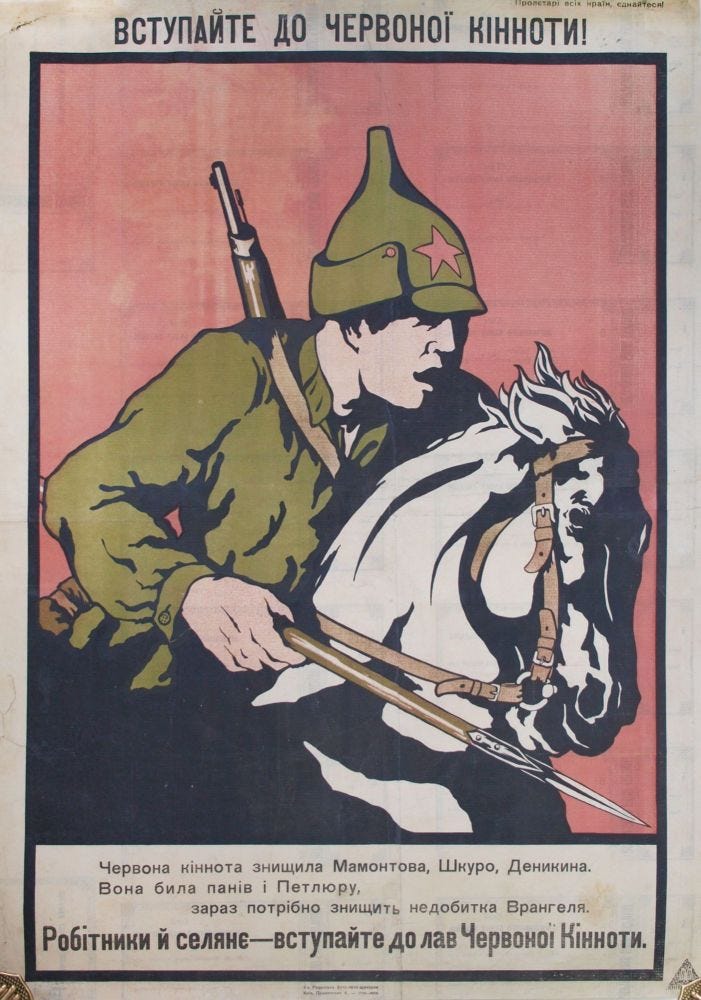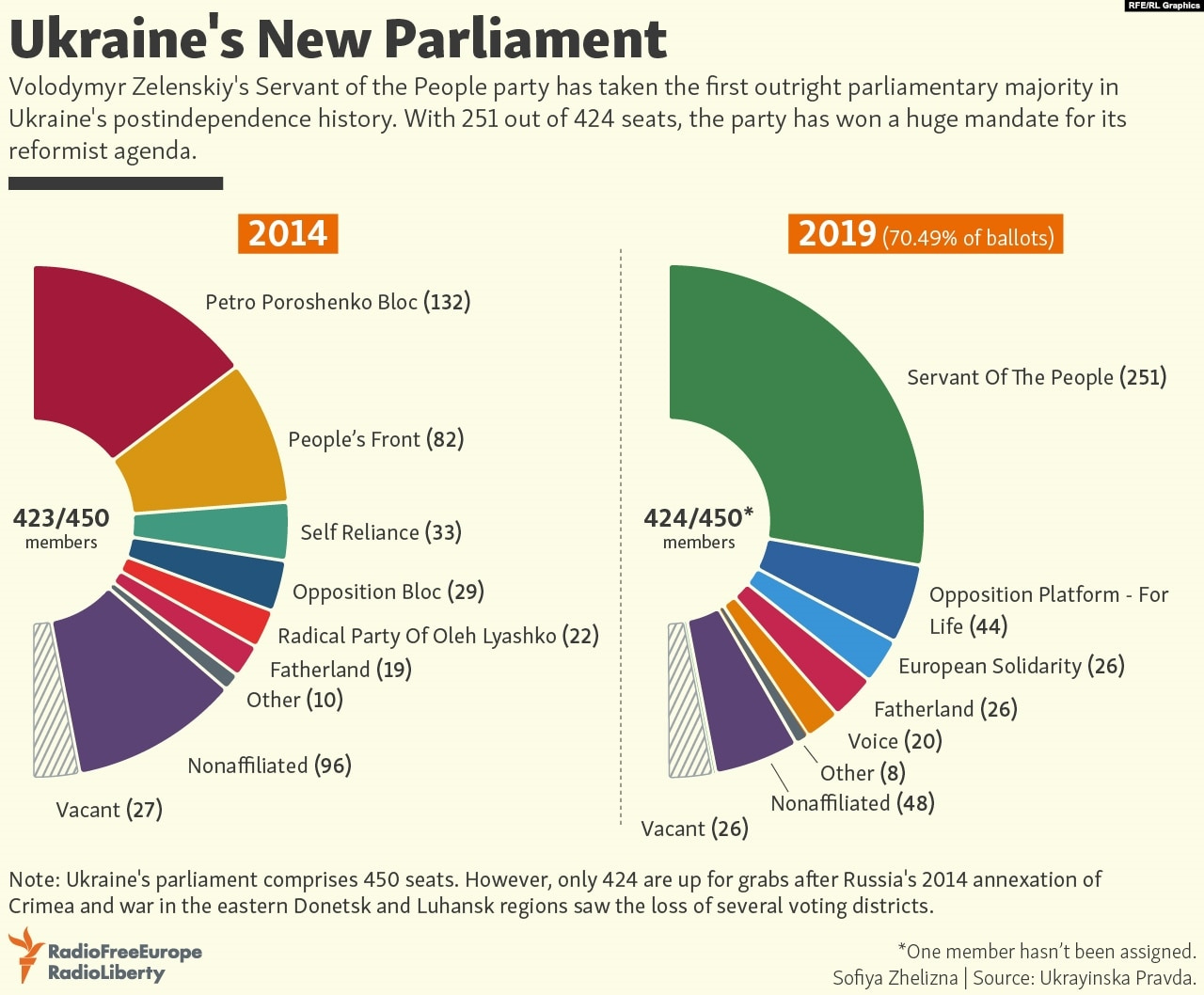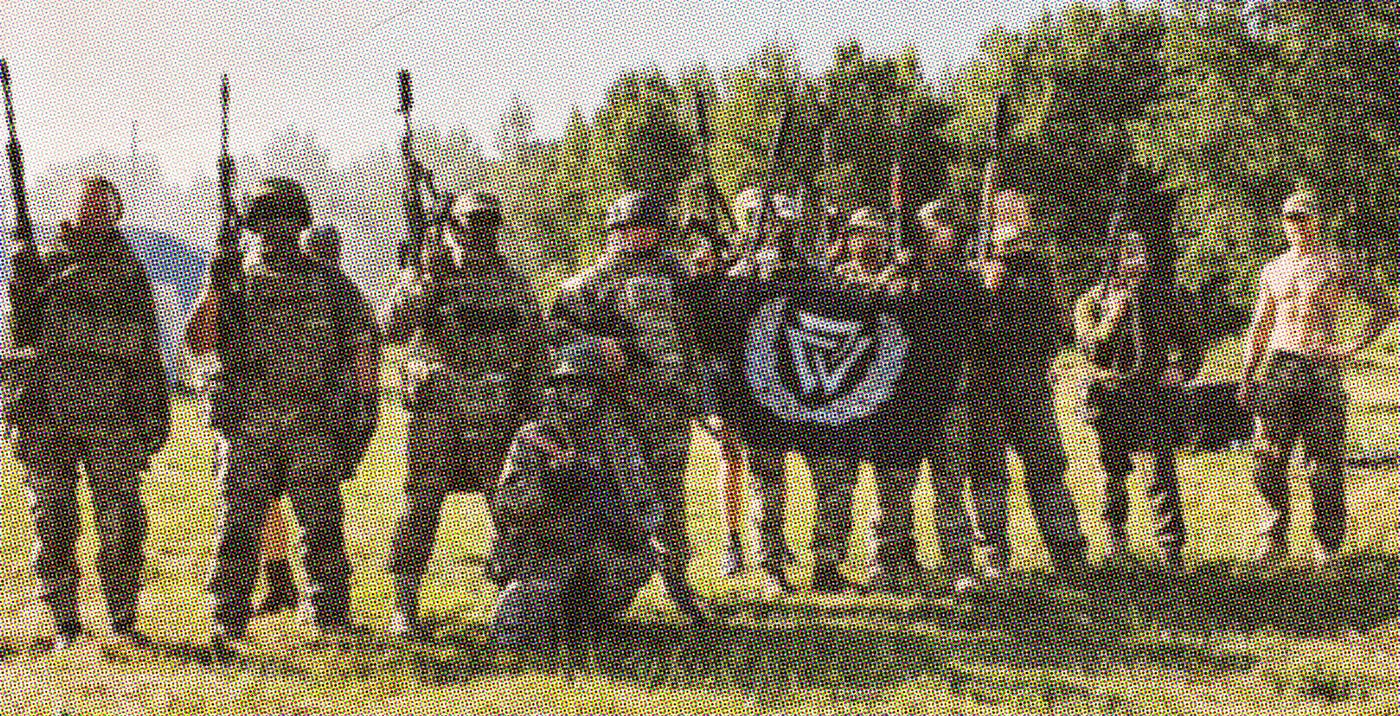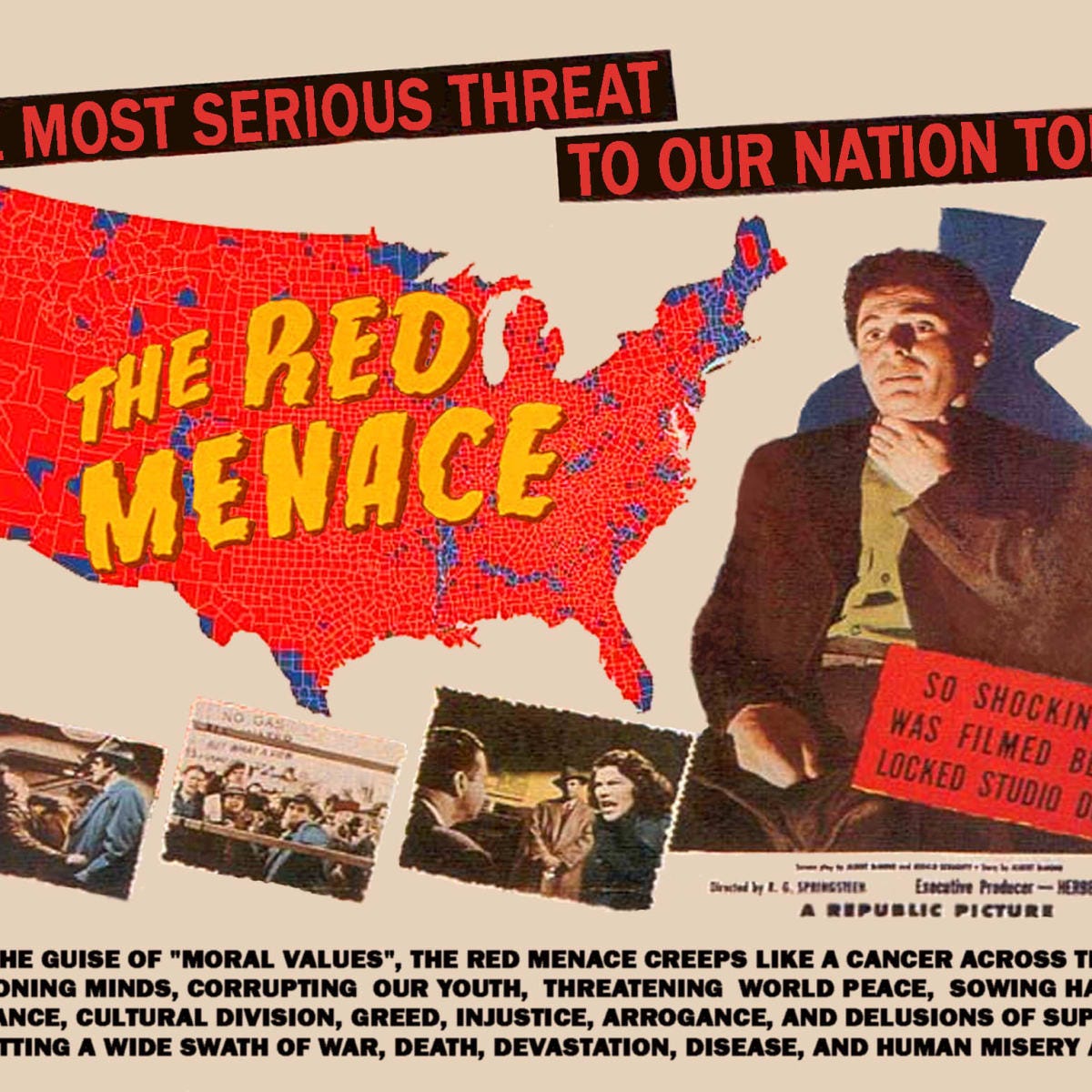Very sorry it’s been so long since my last post on Ukraine—I’d split up a larger general post into multiple smaller ones because it became so unwieldy, but the more research I did, the more each of the smaller posts began transforming into large ones—and then I got buried in deadlines before I could finish any of them. With the news about Mariupol this week though, I thought it would be a good time to finish this one up so we can talk about what is probably the most contentious topic that regularly comes up in conversations about the war: Ukrainian Nationalism.
Let’s get this out of the way: Ukraine is not a country run by Nazis. The current parliament actually passed a law just this past February officially criminalizing antisemitism; when committed by an individual it’s now punishable by a fine or prison sentence up to 5 years, and any public officials in violation of the law will also be banned from holding certain offices for a period of up to 3 years on top of standard punishment. Organized groups or acts even by an individual that have severe consequences are now punishable with prison sentences of up to 8 years. Ukraine now has an actual legal framework for handling any such cases, which is more than we have here in the United States. Here in the USA, we consider everything from racist symbols to racial slurs to burning effigies “protected speech” under the First Amendment, and the Supreme Court has actually repeatedly ruled that what would be considered “hate speech” in other countries is legally protected on a federal level—just to put this into perspective.
A recent poll published by the Pew Research Center showed that Ukraine was the most accepting of Jews among all Central and Eastern European countries—the survey found that only 5% of Ukrainians would not wish to accept Jewish people as fellow citizens, compared to 18% of Poles, 22% of Romanians, and 23% of Lithuanians. Ukraine is estimated to have the world’s third or fourth-largest Jewish community. If we look at the USA, a separate survey conducted by the Anti-Defamation league in 2019 found that 19% of American’s support the antisemitic canard that Jews control Wall-Street, and that 24% of surveyed Millennials and Gen-Zers said that the Holocaust might be a myth.
Yes, there are Neo-Nazis in Ukraine. This statement is both 1. Russian Propaganda, and 2. The Truth. This might be inconvenient to admit today, but after 8 years of Western journalists reporting on the Far-Right movement in Ukraine, we only stand to damage our own credibility by denying it. And I’ve seen many neoliberal types dismissively hand-wave this subject entirely since the start of Russia’s invasion, which is not helpful. The problem here, as with Russia’s framing of all information it presents to The West, is that it draws attention to this fact as if to imply that Neo-Nazis don’t exist within their borders and that they don’t have a far-right extremist movement of their own that is not only significantly larger than Ukraine’s, but it’s been reported since 2014 that Putin has directly financed far-right movements both within Russia as well as all over Europe. Even worse, this information is presented as a justification or even a rallying call in hopes that it will motivate people in The West to support Russia or at the very least, not support Ukraine.
My question then, is why didn’t Putin begin with the Nazis that exist all across his own country? If he was actually on a mission to rid the world of Naziism, and if there was truly a Fascist Nazi Regime in Kyiv, Russia could have rallied Western European countries to help conduct a formal investigation—Especially considering some countries in the west base their entire personalities on being WWII champs and Nazi hunters just as much as Russia does. Perhaps the problem is that the narrative Putin has crafted is fundamentally twisted. His claim is essentially that any Ukrainian who is not pro-Russia must then be a Nazi, and Nazis are traditionally killed by Russians, who defeated them in the Great Patriotic War. Therefore, the “Denazification” of Ukraine = getting rid of any Ukrainian who is unwilling or even unenthusiastic about rejoining Russia.
The truth is, the word “Nazi” is used in Russia the same way that “Commie” was used here in the United States at the height of the Cold War. It’s a vague but scary accusation that can be lobbed at anyone Putin disagrees with that can mean a multitude of things to different people. To this day, there are Americans who still unironically use “Commie” as an insult, and half the time they don’t even know what they’re actually mad about. Most of the time it’s because they believe they’re living in an otherwise meritocratic system that would be perfectly functional if only it wasn’t being threatened by immigrants, or that they shouldn’t have to pay taxes, or something equally stupid.
As far as his own political views, Putin has proven that he’s staunchly conservative. For most of his presidency, he has worked to dismantle left-wing Soviet-era policies—instead of following the USSR model of dedicated atheism, he revived the Orthodox Christian church in Russia, and has since instated a wide range of right-wing, anti-LGBT, anti-feminist, pro-state-capitalist policies that have nudged Russian culture ever further into close-mindedness, bigotry, and chauvinism. It’s also why Putin appeals to our own increasingly fascistic Republican party; the model he has created within the Russian Federation is every paternalistic political conservative’s wet dream.
The Kremlin’s other, more important reason for claiming that Ukraine is overrun with far-right fascists is that it stirs a very real sense of generational trauma within Russians by reminding them of their direct confrontation with the German army in WWII—which, again, through the implementation of Memory Laws, has crystalized into a dishonest narrative about how the Soviets singlehandedly beat back the fascist Nazi regime in the Great Patriotic War by allowing narratives from both World War Two and the Russian Empire’s Patriotic War of 1812 against Napoleon converge. This new story has served as a reliable source of nationalistic pride for many Russians, who celebrate Victory Day on May 9th—another Putin-era tradition, not a Soviet one.

But the truth is messier than that; in reality, it was the American Lend-Lease Program that supplied the USSR with modular war factory designs and schematics straight from Detroit, tanks, bombs, and additional materials, but not any troops, because The Allies were counting on Stalin to use his most abundant resource against Hitler’s army: his people. The Red Army was the only fighting force in Europe that could go toe to toe with the German army in terms of scale, and much of the most brutal fighting happened when they met on the Eastern Front. (And yes, it’s the very same Lend Lease Program that is now being activated for the first time since WWII in Ukraine, that Congress unanimously voted through recently, and that has allowed Joe Biden to magically make over 40 billion dollars worth of aid materialize out of thin air. Meanwhile, Flint hasn’t had clean drinking water in a decade. This isn’t to say that we shouldn’t be doing everything we can to support Ukraine, but it is telling how eager our government is to throw the kitchen sink at military spending while refusing to spend a penny on badly needed domestic social programs. Perhaps these things shouldn’t be mutually exclusive, but what do I know. 😐)
Anyway, what the modern narrative in Russia today leaves out about the “Great Patriotic War” is that at various points during WWII, Ukrainian men accounted for anywhere between 40-80% of the Red Army’s fighting forces, and along with the Belarusians, made up the majority of the first line of defense against the Nazis. During 1943-1945 about 4.5 million Ukrainians became Red Army soldiers. The losses of the Ukrainian people, many of whom were Jews, during World War Two accounted for 40-44% of the total losses of the USSR, and the territory that was most heavily occupied during Operation Barbarossa was in Ukraine. This might be why “Victory Day” isn’t celebrated on May 9th there, but instead is a somber remembrance of the trauma and sacrifice of WWII that occurs on May 8th instead.
“Ok, but what about the Azov Battalion?”

Alright, let’s talk about the elephant in the room. The Azov Battalion, now formally named the ‘Azov Special Operations Detachment’ (but also known as the Azov Regiment) is a unit of the National Guard of Ukraine that is famous for its ties to Neo-Nazi and far-right ideology. The group uses controversial symbols such as an inverted Wolfsangel and Black Sun, and both were insignia used by Nazi SS divisions. Numerous members have been identified bearing SS tattoos, including swastikas. Sure, we can talk about the shifting meaning of symbols over time or the way the Nazis co-opted existing symbology, but regardless, the optics here are undeniably bad.
The Azov Battalion started out as a local “self-defense force” in the eastern Donbas region primarily made up of football hooligans and ultras. At the start of the War in Donbas, Viktor Yanukovych had just recently fled Ukraine after the Maidan Revolution and while an intermittent government had been put in place to maintain stability ahead of formal reelections, there were a severe lack of procedural standards in place that revealed an extremely weakened and dysfunctional State. The official Ukrainian armed forces were incredibly ill-equipped and ill-prepared as they had been intentionally dismantled by previous leadership over many years, and predictably, they were unable to fend off Russian forces during both the Annexation of Crimea and the attack in the Donbas.
As a result of this precarious situation, the Ukrainian government officially requested the help of local defense forces like Azov. It has to be recognized that only a weak and/or dysfunctional State has to ask for help from outside forces, and that if there was a functional government throughout the years that Yanukovych was in power, the actual Ukrainian army likely would have been able to mobilize to defend against the Russian invasion. But in 2014, there weren’t many other options outside of the handful of local defense groups and militias that had started to form, and when someone starts a fire, the natural response is to reach for the nearest source of water to put it out. Even if that source of water is the sewer.
But hold on—as we’ve seen in the Ukrainian War of 2022, it’s pretty clear that some significant changes have taken place over the past 8 years. The Ukrainian Army has transformed into a professional fighting force that has shown itself to be capable of holding off a full-scale Russian invasion for 80+ days. Since its founding, Azov has gone through many member cycles and reforms, taking it from roughly 2500 members at its peak to a reported 900 members in 2022. Today, the Azov Regiment is comprised of Ukrainian citizens from a wide range of ethnic backgrounds: Ukrainians, Russians, Georgians, Belarusians, Jews, Greeks, and even Crimean Tatars. Their members are mostly Russian-speaking, and they were based in Mariupol.
Azov's founding member, Andriy Biletsky is a Ukrainian white nationalist and founder of several other far-right groups such as Right Sector and the Social National Assembly (SNA). By September 2014, he left the Azov Battalion to start the National Corps political party, through which he was able to secure a seat in the Ukrainian Parliament. He was a member of Parliament from 2014-2019, though he was unable to write any laws that were actually adopted during this time. In the 2019 Parliamentary election, Biletsky’s Svoboda party only received 2.15% of the vote, which did not clear the 5% election threshold and thus did not gain any parliamentary seats.

So here’s where I land on Azov, personally: I don’t know how many Nazis exist within their ranks, kind of like I don’t know how many Nazis exist within the ranks of my own country’s armed forces. And while I find the thought unsettling, I ultimately don’t lose sleep over it, because I live in a country with an established chain of command and a (somewhat—this is becoming more debatable by the day 😑) functional government that holds soldiers to a set of standards that prevent them from carrying out coordinated attacks or forming into informal battalions based on any kind of shared fringe ideology. Countries with strong democracies tend to have professional militaries rather than ones made up of football hooligans and larpers—And all evidence points to Ukrainians risking life and limb for nearly a decade to fight for the right to be a democratic nation, so… I believe that much like our own country, there are definitely Neo-Nazis, and like our own country, they don’t have any real institutional power. (Again, this might be more debatable in the USA than in Ukraine, sadly.)
Here’s the thing about Nazis: even though they’re historically famous for referring to various racial and ethnic groups as vermin, they are actually the ones who behave like cockroaches as they seem to be capable of surviving just about anywhere in sub-optimal conditions. After WWII, Germany went through decades of very intentional reconstructive efforts, educational reforms, public apologies, ongoing reparations payments, implementation of laws banning Nazi insignia and Naziism, etc. And yet, there are still Nazis in Germany and a very real growing threat from far right extremists. The only method that has proven effective at dealing with extremism of this nature to some extent is to have a strong civil society, a capable government, and official peacekeeping forces with an accountable chain of command, who abide by the rule of law (as opposed to paramilitary groups or militias); and Ukraine has proven that it is committed to this exact model.
Lastly, when it comes to the Azov regiment, I think the most important thing is to ask Ukrainians themselves. I found this Reddit post explaining Azov from the perspective of an actual Ukrainian citizen to be pretty insightful, and I recommend giving it a read. It links to some other interesting posts and the replies are worth looking at, as well.
“Ok, but what about the Banderites?”
Again, “Banderite” is 1. A Russian Propaganda Term with flexible meaning and 2. A real moniker for supporters of Stepan Bandera. After the Bolshevik revolution and the fall of the Russian Empire in 1917, Bandera emerged as a defining voice of Ukrainian Nationalism. He became radicalized after the Polish-Ukrainian War (1918-1919) and was even sentenced to life in prison after orchestrating the 1934 assassination of Poland’s Minister of the Interior. He was released from prison in 1939, following the German-Soviet invasion of Poland. (Oh yeah, did I mention Hitler and Stalin agreed to split Poland between them, like some kind of horrific friendship necklace?)
Bandera joined the far-right Organization of Ukrainian Nationalists and began collaborating with the Nazis, and when Germany invaded the USSR, he created the 1941 Proclamation of Ukrainian Statehood in Lviv, in which he pledged to work with Nazi Germany. He was immediately arrested by the Gestapo and sent to Sachsenhausen concentration camp. By 1944, with Germany losing ground to advancing Allied Armies, Bandera was released in the hope that he would help deter Soviet forces. He instead settled in West Germany where became the leader of OUN-B and worked with several anti-communist organizations until he was assassinated by KGB agents in Munich.
Stepan Bandera was an antisemite and a Nazi-collaborator, who held far-right nationalist beliefs and was largely responsible for the massacre of Polish civilians, as well as the Holocaust in Ukraine. After former Ukrainian President Viktor Yushcheko was poisoned during his election campaign in 2004, he managed to stay in office until he was removed in 2010—and as a parting act of defiance against Russia, he awarded Bandera the posthumous title of Hero of Ukraine. The award was largely condemned by the international community, and when Yanukovych returned to the presidency, he annulled the award. A proposal to confer the award on Bandera was then rejected by the Ukrainian parliament in 2019.
Bandera remains a controversial figure in Ukraine. Some hail him as a liberator who defied the Soviets, the Polish, and the Nazis while fighting to establish Ukraine’s independence, while others condemn him as a fascist war criminal. There are several statues of Bandera throughout Ukraine that were erected to replace monuments to Lenin that were destroyed between 1991-2017, which continues to be a point of contention. We’ve also built monuments to problematic figures in the USA, and in my opinion, we shouldn’t idolize or immortalize individual human beings in stone and should instead build monuments to ideas that inspire us and remind us of our collective strength, not just one (extremely) flawed man’s.

On Ukrainian Nationalism
A part of the world that is famous for its White-Separatist and Neo-Nazi movements but doesn’t get talked about nearly enough is: The Pacific Northwest. Yeah. Just outside of both Seattle and Portland you will find far-right militias and extremist groups like the Aryan Nation, which long predates any current geopolitical trend lines. Americans understand that these demographics are not representative of Washington and Oregon as a whole, and we can clearly see that the majority of the people who live in the surrounding areas do not share these kinds of destructive views. “Nazis” is not a valid justification for indiscriminately shelling and killing the civilian population of a sovereign state, which is exactly what Russia is doing to Ukraine today. And when someone’s kneejerk response to this war is to go down a whataboutism rabbit hole that perfectly aligns with Putin’s talking points, I have to wonder exactly what their end goal is.
If we look at the post-WWII behavior of the major players in the Eastern Front, the only country that has yet to acknowledge its own atrocities that were committed during this time is, well, the Russian Federation. And the longer true historical facts are hidden from Russian people, the harder it will be to ever actually reckon with their own identity. Americans know this better than most, as we have collectively avoided fully owning up to our own sins for centuries now, and as a result, our own national wounds continue to be unable to actually heal.
As I said in my previous post, we Americans are notorious for not having a solid grasp on world history and we often assume that our own definitions and narratives are the standard worldwide, which means that more often than not, we dismiss important cultural or historical context in favor of defining things in black-and-white terms like ‘Good and Evil’ or ‘Right and Wrong’ because we like easy, uncomplicated answers—but Ukraine’s history has more shades of grey than that; the reality of being a country surrounded by conquering empires on multiple sides is that different people have been subjugated by different invading forces at different points in time. And in the years between WWI and WWII, Ukraine ended up in the crosshairs of not 1, not 2, but at times, 3 aggressive countries simultaneously.
It’s understandable that Ukrainian Nationalism was born out of the fight against those conquering forces—especially in retaliation to the one that has subjugated them for the longest period of time: Russia. That being said, I hope that sooner rather than later, this war is ended and the Ukrainian people can go back to shaping their national identity and pride around the wider range of other articles that unite them.
The truth of war is that individual people are capable of doing both extremely good and extremely bad things, and that just because a group of people is fighting for a moral cause does not mean they’re always doing it for moral reasons. Soldiers follow orders that come from leaders in the ruling class, and the people who suffer the most are always the ones who have the least power and resources to begin with. So while it’s understandable to want to attach a simplified narrative to try to make sense of the horrifying images we’ve been seeing since February, that inevitably leads to assigning moral judgements on individuals, which inevitably leads to Hero Worship, which in my opinion, is never a good thing.
I’ll leave you with this DN interview featuring Timothy Snyder, who specializes in Eastern European and specifically Ukrainian history. I think historians are especially worth listening to in this moment as they generally do not frame their assessment of current events within the confines of modern politics, and they’re able to provide a level of context that might be hard to see if you’re not zoomed all the way out.










Please keep writing these essays. They are very useful for someone who isn’t keeping up with the news but enjoys a concise and accurate article from a left wing point of view.
Thank you for putting so much time into this - even though I read a lot and follow tons of Ukrainians online now, you still put things in such a clear way that I got new things out of it. I'm glad you have this space to work through ideas that have such serious consequences for Europe - and for the world. I love that I initially joined here because of my years-long love of your art, but I'm getting so much more out of it! <3